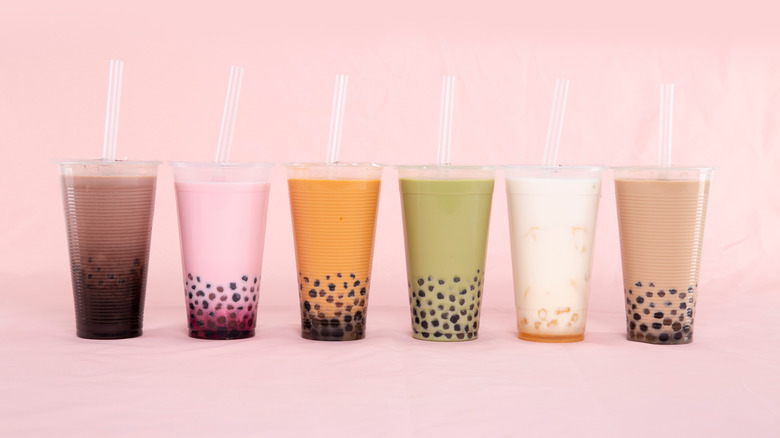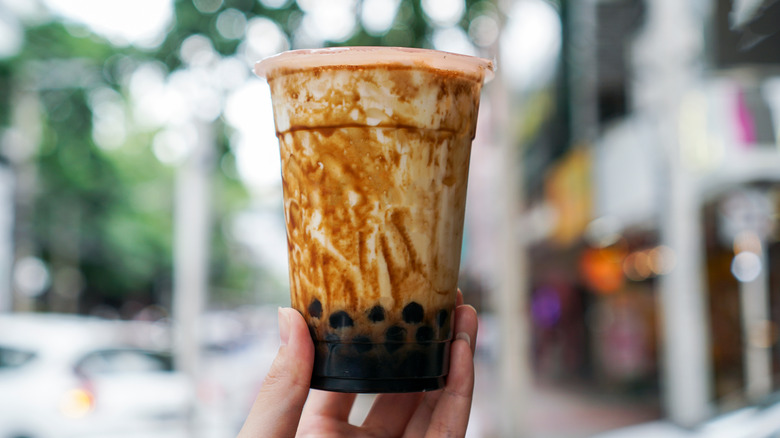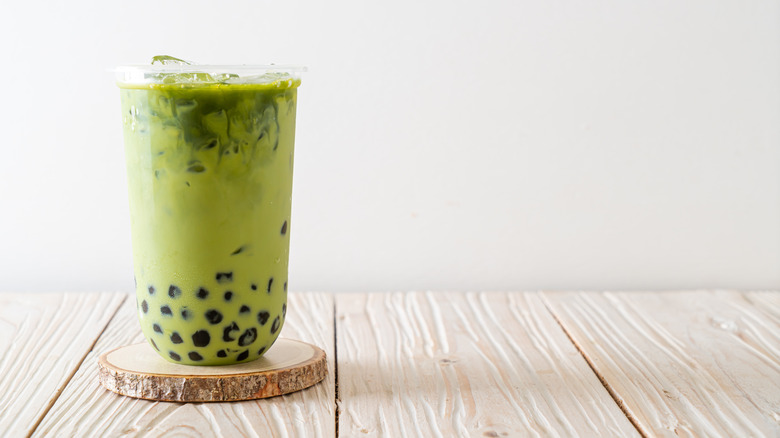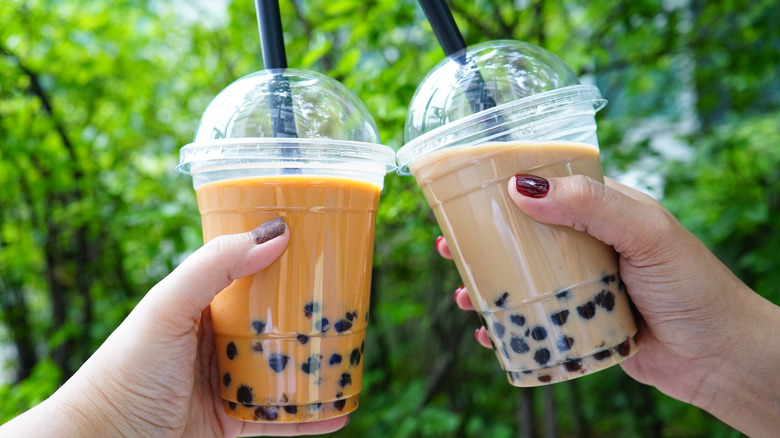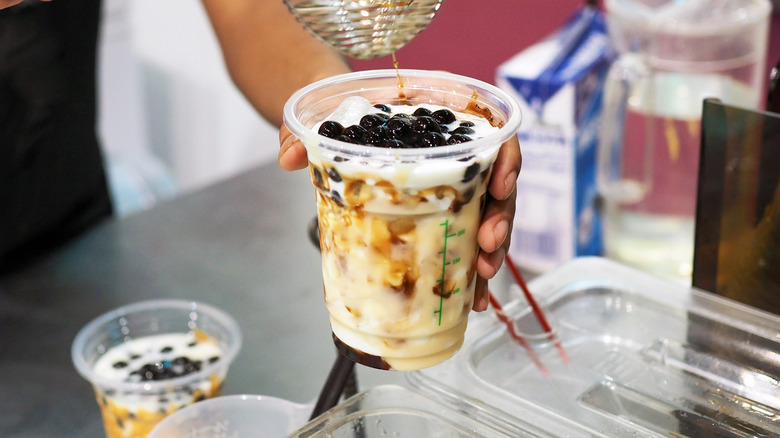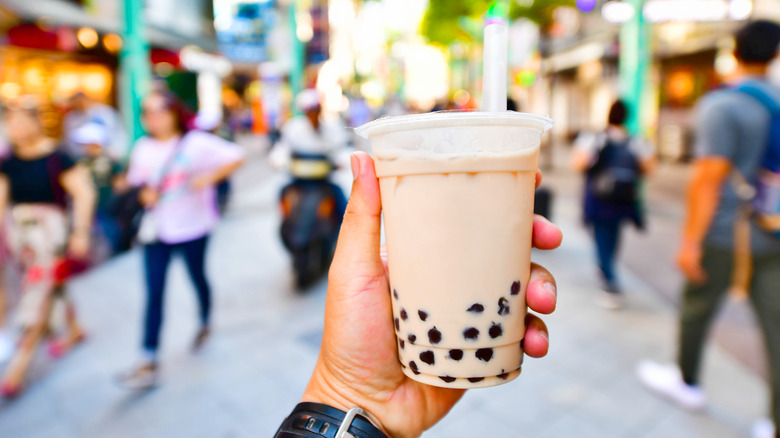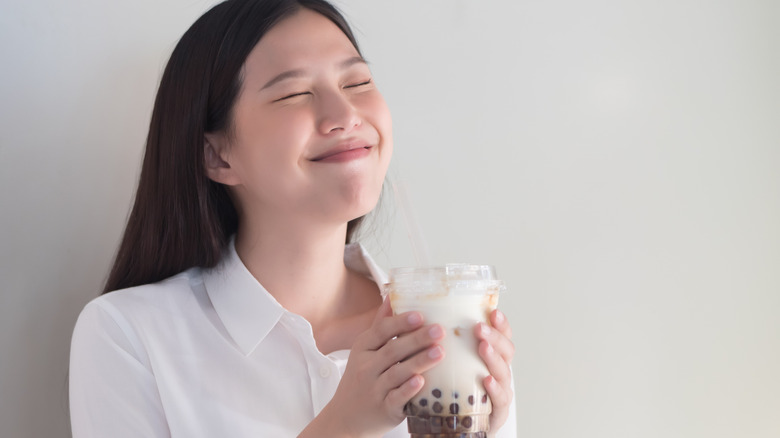When You Drink Boba Every Day, This Is What Happens
There's a reason boba or bubble tea is so popular. Even though the drink originated in Taiwan, it has recently become popular all over the United States with shops dedicated to the making of the tea popping up all over. Thrillist notes that the boom of boba tea is partly due to its popularity amongst students and the availability of the milky caffeinated beverage near college campuses.
Boba can be used to refer to both the black tapioca pearls as well as the drink as a whole (via Eater). However, the drink itself goes by different names — it can be called boba tea, bubble tea, or pearl milk tea — depending on where you are in the world. Whatever you choose to call the tea, boba is usually made with black tea, milk, ice, and tapioca pearls.
Part of boba tea's popularity is because you can pretty much go all out to customize it. In addition to adding syrups and toppings, the chewy tapioca pearls come in a variety of flavors. They're also quite addictive. According to Eater, tapioca pearls start out as hard and tasteless little balls. They are then boiled and steeped into a caramelized sugar syrup until they turn black, bouncy, and delicious.
It may be a well-known fact that boba can be irresistible, but what happens when you drink it every day?
You might be constipated
In 2019, Asia One reported that a 14-year-old girl in China complained of severe stomach pain and constipation. Upon running a CT scan, doctors found the cause for her ailment to be a hundred undigested tapioca pearls in her abdomen.
Upon speaking with Dr. Vladimir Kushnir, a specialist in gastroenterology, Health found that the chances of boba itself causing constipation are low.
The doctor also noted that the cause of constipation and stomach pain from the drink is guar gum, an additive that is often put into tapioca pearls because it is fibrous and helps hold the tiny balls together. Since the additive expands when it comes in contact with water, it can cause constipation when consumed in high quantities and without enough water to wash it all down.
Dr. Kushnir added that if you're drinking only one or two cups of boba every day, you should be in the green. But, if you drink more, you could notice signs of constipation.
You might be at the risk of a caffeine overdose
Since boba tea is made from a base of black, or sometimes green, tea, it does contain caffeine (via Full Coffee Roast). A regular cup contains somewhere between 100 milligrams to 160 milligrams of caffeine. According to Mayo Clinic, healthy adults should consume no more than 400 milligrams of caffeine a day, and children and adolescents should consume even less.
Now, the caffeine present in a single cup of boba might not seem like a lot. But if you're drinking more than one cup every day, it can quickly add up to a lot and mixing it with other sources of caffeine like coffee, energy drinks, alcohol, and other drugs could cause a caffeine overdose. Plus, Healthline notes that caffeine can stay in your blood for anywhere between 1.5 to 9.5 hours, meaning if you're drinking several cups of boba every day, it's best to do so with caution.
Your body will get an energy boost
On the flip side of a caffeine overdose are the more positive effects that the hormone brings to the table. Examine explains that adenosine and A1 receptors work together in the brain to relax muscles, which causes sleepiness. As the day progresses and the body goes through brain use and physical labor, more and more adenosine is produced leading to a gradual feeling of fatigue through the day.
Boba and the caffeine that it contains prevents adenosine from reacting with A1 receptors and gives you the rush that you need to stay awake. The caffeine in boba also releases dopamine and glutamate, both of which can make you feel happy. And, the tapioca pearls in boba tea contain carbohydrates, which can be a good source of energy (via Healthline).
When consumed in moderation every day, boba can help you power through afternoon fatigue with a boost of caffeine and energy.
You might gain weight
Food Science & Nutrition conducted a study in 2017 to examine the sugar and calorie composition of boba. The study found that a 16-ounce serving well exceeds the upper limit of sugar intake recommended by the 2015 US Dietary Guidelines Advisory Committee Report and contains between 200 and 450 calories. Boba also meets the definition of a sugar-sweetened beverage by the US Dietary Guidelines and is classified as such. All this may seem like scientific jargon, but there are several implications of boba being classified as a sugar-sweetened beverage.
Healthline reports that sugar-sweetened drinks like boba contain fructose, a type of sugar that can make you feel hungry and hinder the work of leptin, a hormone that regulates hunger and tells your body when it's time to stop eating. This is why you likely won't feel full after drinking boba and may end up eating more food on top of the calories you already consumed.
You might increase your risk of type 2 diabetes
Boba contains a very high amount of sugar. To help put it in perspective, dietitian Kong Woan Fei told The Star that one cup of bubble tea contains 20 teaspoons of sugar. Now soft drinks are especially notorious for being extremely sugary but Kong says that boba tea is much worse. For example, one cup of brown sugar boba tea, the dietitian said, "contains three times more sugar than a can of soft drink."
The most obvious effect of consuming 20 teaspoons of sugar every day is obesity and the risk of diabetes it can cause. Healthline also adds that consuming so much sugar every day can make your body resistant to insulin. The proper working of insulin in your body, the website says, is very important as it is responsible for regulating sugar levels in your blood. If your body becomes resistant to insulin, the sugar in your blood can spike and increase the risk of type 2 diabetes.
In a 2013 study conducted on people from over 175 countries, researchers found that for every 150 kcal per person per day (which is about one soft drink), the risk of diabetes increases by 1.1%. Now imagine consuming three times that much sugar every day!
You might increase the risk of certain types of cancer
Consuming a high amount of sugar every day can lead to weight gain, obesity, and an increased risk of type 2 diabetes. What it might also do is increase the risk of certain types of cancer.
In 2012, German researchers found traces of aspolychlorinated biphenyls or PCBs in tapioca balls (via Huff Post). PCBs, the study says, are a cancer-causing chemical that can also have negative effects on the immune system, nervous system, and endocrine system, on top of increasing the risk of cancer. Healthline has since debunked the study's claim, adding there's a lack of scientific evidence to back the study's theory. However, in a separate article, the site does write that there is a risk of certain cancers, such as esophageal, pleural, endometrial, and cancer of the small intestine, caused by a high sugar intake.
They explain that the health risk comes from obesity and the body's resistance to insulin, both of which are the result of consuming high amounts of sugar.
Your metabolism can benefit from antioxidants
Apart from caffeine, the tea that boba contains is a rich source of antioxidants. Eat This, Not That! says that no matter the type of tea you choose to add to your boba — black, green, Thai, or oolong — all types of tea can boost your metabolism, help burn belly fat, and increase the rate at which the liver burns fat.
If you're going to drink boba every day, choosing green tea as your base is one of the best options. It is higher in polyphenols than black tea and polyphenols are powerful antioxidants that can protect the body from certain diseases (via BBC Goodfood). Healthline also finds that polyphenols can reduce inflammation.
Green tea also contains epigallocatechin-3-gallate (EGCG), a catechin, which is a type of naturally occurring antioxidant that prevents cell damage.
However, The Guardian reported that, based on a German study published in the European Heart Journal, adding milk to tea can modify the tea's biological properties and fully wipe off any benefits that the tea might have to give.
